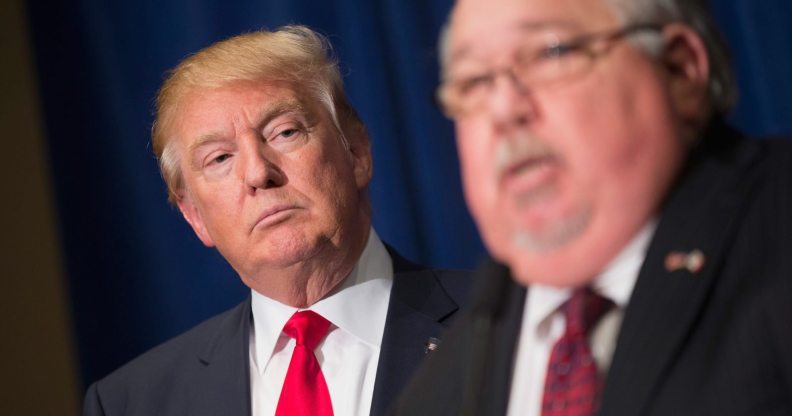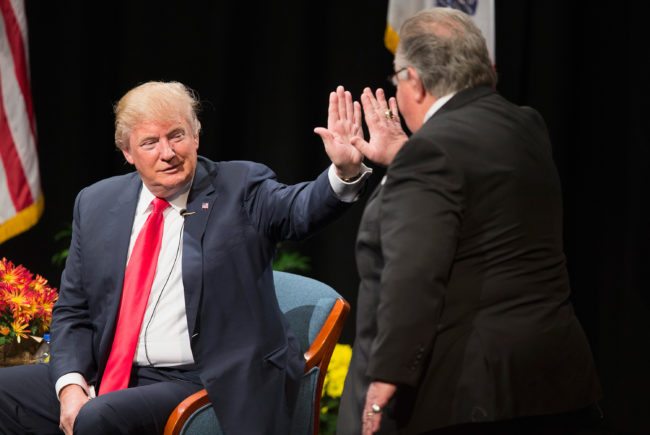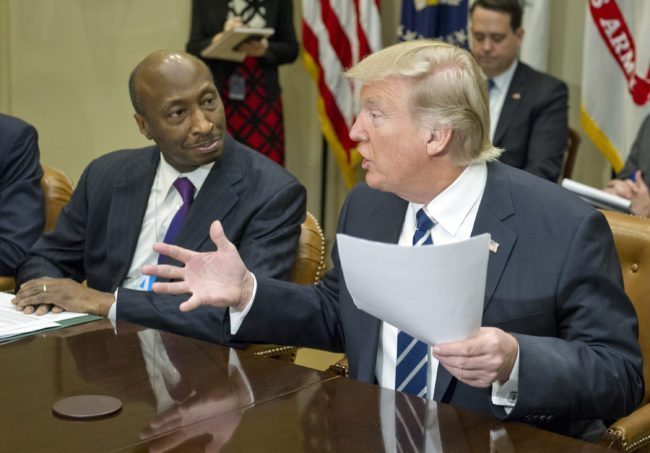Trump’s new chief scientist thinks same-sex marriage could lead to the legalisation of paedophilia

(Getty)
Trump’s pick for chief scientist for the Department of Agriculture thinks “as far as we know” homosexuality is a choice.
Sam Clovis has also said that he thinks that legalising same-sex marriage could lead to the legalisation of paedophilia.
The comments were made by Trump’s potential new advisor made the comments between 2012 and 2014 as a radio talk show host and a political activist, a CNN KFile review found.
He was also briefly a candidate for the US Senate in Iowa.

Trump’s nomination for the post has been criticised by Senate Democrats who argue that his lack of scientific credentials make him unqualified for the position.
“Someone who engages in LGBT behavior — I don’t know what the science is on this, I think it’s still out — but as far as we know, LGBT behavior is a choice they make, Clovis says in a video obtained by CNN’s KFile.
“So we’re being asked to provide Constitutional protections for behavior, a choice in behavior as opposed to a primary characteristic.”
Writing in 2011 for the Iowa Republican blog, CLovis argued that if gay people were protected by the US constitution, so should left-handed people.
He wrote: “Today, there are six protected classes of American citizens who benefit from the history of legal precedents associated with American traditions and the 14th Amendment. Two of these classes—religion and military—have long been established in the traditions of the nation. The other four—race, gender, disability and age—are based on primary characteristics.
“Primary characteristics are those human features we can generally discern by visual examination—something we can see. Following this logic, the only way to extend 14th Amendment protections to those in the LGBT lifestyles is if these behaviors are genetically mapped or otherwise discernible. The science on this issue seems to be uncertain, and if one followed the arguments from plaintiffs, the issue argued was that these individuals, because of ‘love,’ should be allowed to ‘marry just like opposite-sex couples.’ What is it really? Is this about genetics or about emotions? The stronger case is genetics, but that is not the argument being advanced.
“If LGBT adherents were genetically predisposed, then one must ask why a segment of the population that constitutes numbers less than one third of those who might be left-handed or one fourth the number who might be blue-eyed or one eighth the number who might be genetically predisposed to obesity should receive 14th Amendment protections when others are not even considered. Certainly left-handers have more to bark about than most. Thus, the argument must be about something other than genetic predisposition.”
He has also used the “religious freedom” argument to rally against LGBT rights.
While he was a candidate for Senate nominatio in Iowa, Clovis said “as far as we know” being LGBT is a choice.
“Someone who engages in LGBT behavior — I don’t know what the science is on this, I think it’s still out — but as far as we know, LGBT behavior is a choice they make, Clovis says in a video obtained by CNN’s KFile.
“So we’re being asked to provide Constitutional protections for behavior, a choice in behavior as opposed to a primary characteristic.”
“There’s no equivalency there between the civil rights issue associated between those protected classes and the civil rights of someone who engages in a particular behavior,” added Clovis.
“Follow the logic, if you engage in a particular behavior, what also becomes protected? If we protect LGBT behavior, what other behaviors are we going to protect? Are we going to protect pedophilia? Are we going to protect polyamorous marriage relationships? Are we going to protect people who have fetishes? What’s the logical extension of this? It can’t be that we’re going to protect LGBT and then we’ll pull up the ladder. That’s not going to happen, it defies logic. We’re not thinking the consequences of these decisions through.”
Asked whether Clovis thought his words might be interpreted as extreme, he said: “I don’t think it’s extreme… I think it’s a logical extension of thought. And if you cannot follow the logic then you’re denying you’re in denial.”
Clovis has also suggested that same-sex marriage would lead to polyamorous “arrangements”.
He wrote in 2012: “In America, there has been strong support in our legal system to define marriage as between one man and one woman.
“In particular, the Supreme Court as far back as the 1870s established that very definition of marriage. What seems the most troubling about extending the definition of marriage to same-sex couples is that it will be difficult to stop with this revised definition.
“Is the LGBT community wanting to stop the marriage arrangement at any two consenting adults? This is illogical. If society chooses to alter the definition of marriage, how can there be a line drawn at two adults? What is to say that polyamorous arrangements should not be included? What about other relationships? If that is the goal of the LGBT community leadership, then the reasons for rearranging the traditional definition is far more nefarious than just making a small segment of the population feel better.”
Writing in the same post, Clovis argues that businesses should be allowed to discriminate against LGBT people if doing so runs contrary to their religious beliefs.
“Homosexuality and personal choices about one’s sexual preferences is not at issue. Businesses today have extended support to life partners in a number of ways. It’s just good business if that is what it takes to get the best person for the job,” said Clovis.
“On the other hand, businesses and their owners should be able to make decisions about who is employed if hiring people who do not behave in accordance with some deeply held religious belief system is at issue. Just as the government should not force business owners or enterprises to provide contraceptives or morning-after pills because of religious beliefs, the government should not be in charge of hiring practices, either. Religious freedom, perhaps the most fundamental of all protected freedoms, must be free of government interference.”
Trump’s approval rating last week hit an all-time low.
The low approval rating for Trump also comes after his first 100 days were a disaster for LGBT+ people in the US.
He most recently banned transgender troops from serving openly in the US military, claiming that he was doing a “great favour” to the military.
He cited costs, saying it would be too expensive to cover transgender health benefits for those serving.
But despite this it will cost the military 114 times more to ban transgender troops than it would to allow them to enlist.
Despite the assertion that it would cost the military too much to implement a transgender-inclusive policy, the Department of Defense spent five times more on Viagra in 2014 than it would on care for transgender troops.
Out trans former Navy SEAL Kristin Beck challenged President Trump to tell her to her face that she is “not worthy” after he announced the policy.
She also noted the negligible cost of providing the healthcare to trans troops compared to other military costs.
According to reports, the Pentagon was unaware that Trump was about to announce the rolling back of the Obama-era change.
It is not the first time Trump has gone out of his way to reverse a decision on LGBT rights made by Obama.
The GOP leader has already scrapped protections for transgender school kids, ceased government opposition to state-level anti-LGBT laws, and sought to slash HIV aid funding.
The decisions sour Trump’s previous claims during his election campaign to be a “friend” of LGBT people.

In a speech directly after the Orlando massacre he had claimed: “Ask yourself, who is really the friend of women and the L-G-B-T community, Donald Trump with his actions, or Hillary Clinton with her words.”
He also won endless praise from gay Republicans for waving a Pride flag on stage, while making no pledges on LGBT rights.
The ACLU has said it will take to the courts to challenge the ban.

